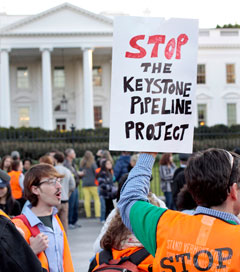Support justice-driven, accurate and transparent news — make a quick donation to Truthout today!
Washington — On a sunny, cloudless day, thousands of protesters encircled the White House Sunday in a show of numbers intended to persuade President Barack Obama to stop a proposed oil pipeline from being built.
The Keystone XL pipeline would stretch 1,661 miles from Alberta, Canada, to Texas' Gulf Coast and requires a presidential permit because it crosses the U.S.-Canada border. Environmentalists say the project is a key test of Obama's green credentials.
Wearing orange vests with the message “Stop the pipeline #noXL,” protesters first heard from prominent environmentalists, a preacher, a Nobel laureate, and a movie star, and then gathered to hold hands in a ring that stretched in front of the White House and several blocks down side streets before joining up behind the White House lawn. Organizers estimated that the crowd exceeded 10,000 people.
“You can't occupy the White House, but you can surround it,” said environmentalist and protest organizer Bill McKibben in a reference to the Occupy Wall Street movements spreading around the country.
With the failure of climate change legislation on Capitol Hill last year, environmentalists have made stopping the Keystone pipeline their major focus in recent months. They want the president to reject the pipeline because of the risks of spills and what they say is the likely impact on global warming from tapping Canada's vast oil sands. The thick crude from the oil sands produces more heat-trapping carbon-dioxide emissions than regular oil because of the extra energy required to extract and process it.
“That is the second biggest pool of carbon on the planet. If the U.S. government goes ahead and makes it easier to develop that oil-sands project, then there is no credible way to insist that they're working hard on climate change,” McKibben said.
Many people waved blue signs quoting Obama's own words from 2007: “Let's be the generation that finally frees America from the tyranny of oil.”
Leah Delaney, a junior and environmental studies major at the University of Vermont, was one of many college students who traveled to Washington for the protest.
“We're part of the generation that's in charge of the future and as a 20 year-old student, I can't imagine being part of the generation that lets the earth down,” she said.
Obama wasn't at the White House during most of the protest. He spent much of Sunday golfing in Virginia on a crisp sunny day. He said early last week that he will wait for a State Department report that is expected by the end of the year before making a decision.
“My general attitude is, what is best for the American people? What's best for our economy both short term and long term? But also, what's best for the health of the American people?” Obama told a Nebraska television station in an interview. The pipeline would cross through Nebraska.
Mike Doody, 44, took a bus to Washington with several fellow environmentalists from Rochester, N.Y.
“I'm against the continuation of fossil fuel extraction. It's a losing end game to continue something that we all know is killing the planet and is ultimately going to run out,” he said.
Protests often attract celebrities looking to voice their opinions on various pet issues, and Sunday was no different, with actor Mark Ruffalo addressing the crowd.
“(The protest) makes me proud to be an American, and it just gives me a lot of heart. We've been fighting for these things for a while and I think people are really starting to wake-up now, so it's very heartening,” he said in a short interview with McClatchy.
The demonstrators said their protest, one year to the day before next year's election, was a warning to Obama: if he allows the pipeline to move forward, a significant portion of his base will be less inclined to work hard for his re-election campaign.
“Young people still believe in Barack Obama, but we know that he's going to need a little bit of a push from us to make the right decision and fulfill some of those campaign promises that he made in 2008,” said Maura Cowley, the co-director of the Energy Action Coalition, a coalition of 50 youth-led environmentalist and social justice groups.
A two-week anti-pipeline sit-in outside the White House in August resulted in 1,524 arrests, but there were no arrests Sunday.
TransCanada Corp., the company that wants to build the pipeline, has argued that its construction has economic and energy-security benefits. A study written for the company said that 20,000 construction and manufacturing jobs would be created for two years.
Terry Cunha, a TransCanada spokesman, said Americans need to decide where they want to get their oil from and argued that the Keystone XL pipeline would add a new reliable energy source for the U.S.
“Do they want it to come from Canada where we share similar political beliefs and environmental guidelines or do they want to import it from the Middle East or Libya where they do not share the same political beliefs as we do here in North America?” he asked rhetorically.
Jim Hansen, a crusading NASA climate scientist, said if the pipeline is approved, the consequences for the climate could be dire.
“It's still possible to stabilize the climate during the rest of this century if we don't develop unconventional fossil fuels. But if we develop the tar sands and tar-shale, then it's game over.”
(Lippman is a McClatchy special correspondent.)
Media that fights fascism
Truthout is funded almost entirely by readers — that’s why we can speak truth to power and cut against the mainstream narrative. But independent journalists at Truthout face mounting political repression under Trump.
We rely on your support to survive McCarthyist censorship. Please make a tax-deductible one-time or monthly donation.
